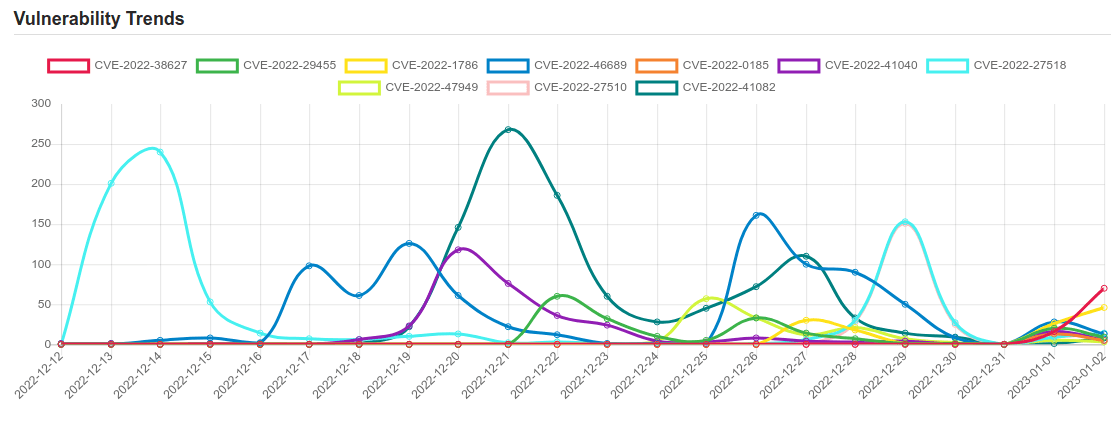Daily Vulnerability Trends: Tue Jan 03 2023

| CVE NAME | CVE Description |
| CVE-2022-27518 | Unauthenticated remote arbitrary code execution |
| CVE-2022-47949 | The Nintendo NetworkBuffer class, as used in Animal Crossing: New Horizons before 2.0.6 and other products, allows remote attackers to execute arbitrary code via a large UDP packet that causes a buffer overflow, aka ENLBufferPwn. The victim must join a game session with the attacker. Other affected products include Mario Kart 7 before 1.2, Mario Kart 8, Mario Kart 8 Deluxe before 2.1.0, ARMS before 5.4.1, Splatoon, Splatoon 2 before 5.5.1, Splatoon 3 before late 2022, Super Mario Maker 2 before 3.0.2, and Nintendo Switch Sports before late 2022. |
| CVE-2022-27510 | Unauthorized access to Gateway user capabilities |
| CVE-2022-41082 | Microsoft Exchange Server Remote Code Execution Vulnerability. |
| CVE-2014-125030 | A vulnerability, which was classified as critical, has been found in taoeffect Empress. Affected by this issue is some unknown functionality. The manipulation leads to use of hard-coded password. The name of the patch is 557e177d8a309d6f0f26de46efb38d43e000852d. It is recommended to apply a patch to fix this issue. VDB-217154 is the identifier assigned to this vulnerability. |
| CVE-2022-37958 | SPNEGO Extended Negotiation (NEGOEX) Security Mechanism Information Disclosure Vulnerability. |
| CVE-2023-0028 | Cross-site Scripting (XSS) – Stored in GitHub repository linagora/twake prior to 2023.Q1.1200+. |
| CVE-2022-42475 | A heap-based buffer overflow vulnerability [CWE-122] in FortiOS SSL-VPN 7.2.0 through 7.2.2, 7.0.0 through 7.0.8, 6.4.0 through 6.4.10, 6.2.0 through 6.2.11, 6.0.15 and earlier and FortiProxy SSL-VPN 7.2.0 through 7.2.1, 7.0.7 and earlier may allow a remote unauthenticated attacker to execute arbitrary code or commands via specifically crafted requests. |
| CVE-2022-47939 | An issue was discovered in ksmbd in the Linux kernel 5.15 through 5.19 before 5.19.2. fs/ksmbd/smb2pdu.c has a use-after-free and OOPS for SMB2_TREE_DISCONNECT. |
| CVE-2018-1002105 | In all Kubernetes versions prior to v1.10.11, v1.11.5, and v1.12.3, incorrect handling of error responses to proxied upgrade requests in the kube-apiserver allowed specially crafted requests to establish a connection through the Kubernetes API server to backend servers, then send arbitrary requests over the same connection directly to the backend, authenticated with the Kubernetes API server’s TLS credentials used to establish the backend connection. |
| CVE-2023-00001 | No description provided |
| CVE-2022-45359 | Unauth. Arbitrary File Upload vulnerability in YITH WooCommerce Gift Cards premium plugin <= 3.19.0 on WordPress. |
| CVE-2021-34979 | This vulnerability allows network-adjacent attackers to execute arbitrary code on affected installations of NETGEAR R6260 1.1.0.78_1.0.1 routers. Authentication is not required to exploit this vulnerability. The specific flaw exists within the handling of SOAP requests. When parsing the SOAPAction header, the process does not properly validate the length of user-supplied data prior to copying it to a fixed-length buffer. An attacker can leverage this vulnerability to execute code in the context of root. Was ZDI-CAN-13512. |
| CVE-2018-25062 | A vulnerability classified as problematic has been found in flar2 ElementalX up to 6.x. Affected is the function xfrm_dump_policy_done of the file net/xfrm/xfrm_user.c of the component ipsec. The manipulation leads to denial of service. Upgrading to version 7.00 is able to address this issue. The name of the patch is 1df72c9f0f61304437f4f1037df03b5fb36d5a79. It is recommended to upgrade the affected component. The identifier of this vulnerability is VDB-217152. |
| CVE-2022-38627 | No description provided |
|
A considerable amount of time and effort goes into maintaining this website, creating backend automation and creating new features and content for you to make actionable intelligence decisions. Everyone that supports the site helps enable new functionality. To keep up to date follow us on the below channels. |








